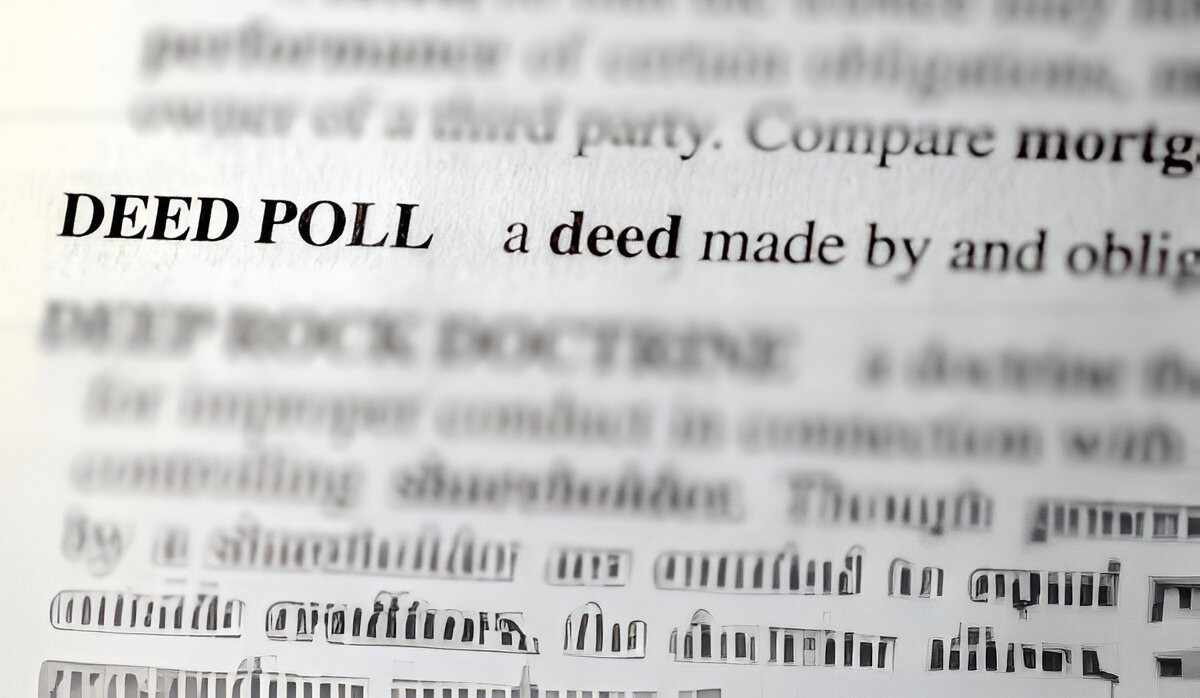A deed poll is a legal document used primarily for making declarations, commitments, or changes to personal or legal status, often unilaterally by an individual. It is a formal and binding agreement executed voluntarily by the person (known as the grantor or executant) without requiring any reciprocal agreement from other parties.
Table of Contents
Key Characteristics of Deed Poll
- Legal Status: It is a legally binding document recognized under common law jurisdictions.
- Unilateral Declaration: Typically involves one party making a declaration or commitment without requiring the consent of others.
- Voluntary Nature: Executed voluntarily by the grantor to formalize intentions or changes in status.
- Enforceability: Once executed, a deed poll is enforceable in courts, subject to legal scrutiny.
How Deed Poll Works
Examples and Usage
1. Name Change Example
- Definition: A common use of deed poll is to legally change one’s name.
- Process: The individual signs a deed poll document declaring the change of name and may publish it in official gazettes for legal recognition.
2. Gender Transition Declaration
- Definition: Individuals transitioning gender may use a deed poll to affirm their gender identity.
- Procedure: Executing a deed poll document to declare the intended change of gender for legal and administrative purposes.
Advantages of Deed Poll
Benefits
- Legal Clarity: Provides a formal legal mechanism to document personal declarations or changes.
- Administrative Recognition: Facilitates official recognition of changes in personal status, such as name or gender.
- Flexibility: Allows individuals to exercise autonomy over personal decisions without complex legal procedures.
Challenges of Deed Poll
Considerations
- Legal Formalities: Requires adherence to legal requirements and potential administrative processes for recognition.
- Public Awareness: Awareness of the deed poll may vary across different jurisdictions, affecting administrative processes.
Importance of Deed Poll
Practical Applications
Legal Documentation
- Name Changes: Formalizing name changes for various personal or professional reasons.
- Gender Identity: Affirming gender identity changes legally through recognized documentation.
Real-world Implications
Legal and Social Impact
- Identity Verification: Supporting identification processes with official documents reflecting updated personal information.
- Rights and Entitlements: Ensuring access to rights and entitlements based on legally recognized personal details.
Example Scenario
Application in Name Change
Scenario: Name Change Deed Poll
- Context: John Smith wishes to change his name to John Johnson for personal reasons.
- Procedure: John executes a deed poll document declaring his new name and submits it to relevant authorities for legal recognition.
Conclusion
A deed poll serves as a crucial legal instrument for individuals seeking to formalize personal declarations or changes in status under common law jurisdictions. Whether for name changes, affirming gender identity, or other personal declarations, it provides a recognized framework for documenting and legally enforcing such decisions. While straightforward in its execution, individuals should adhere to legal requirements and administrative procedures to ensure proper recognition of the deed poll. By understanding its purpose and implications, individuals can effectively utilize deed polls to assert autonomy over personal decisions and ensure compliance with legal standards in various personal and professional contexts. Overall, deed polls play a significant role in legal documentation, facilitating clarity and recognition of personal declarations under the framework of common law principles.





